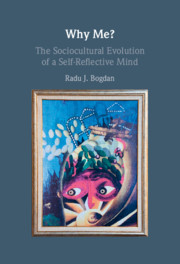
-
Select format
-
- Publisher:
- Cambridge University Press
- Publication date:
- May 2021
- June 2021
- ISBN:
- 9781108999496
- 9781316518182
- 9781108995573
- Dimensions:
- (229 x 152 mm)
- Weight & Pages:
- 0.6kg, 216 Pages
- Dimensions:
- (229 x 152 mm)
- Weight & Pages:
- 0.33kg, 216 Pages
- Subjects:
- Biological Psychology, Psychology, Cognition
You may already have access via personal or institutional login- Subjects:
- Biological Psychology, Psychology, Cognition
Book description
This book explores the evolution of the mental competence for self-reflection: why it evolved, under what selection pressures, in what environments, out of what precursors, and with what mental resources. Integrating evolutionary, psychological, and philosophical perspectives, Radu J. Bogdan argues that the competence for self-reflection, uniquely human and initially autobiographical, evolved under strong and persistent sociocultural and political (collaborative and competitive) pressures on the developing minds of older children and later adults. Self-reflection originated in a basic propensity of the human brain to rehearse anticipatively mental states, speech acts, actions, and states of the world in order to service one's elaborate goal policies. These goal policies integrate offline representations of one's own mental states and actions and those of others in order to handle the challenges of a complex and dynamic sociopolitical and sociocultural life, calling for an adaptive intramental self-regulation: that intramental adaptation is self-reflection.
Reviews
‘This is an articulate, thoughtful, and scientifically informed treatise about humans’ unique self-reflective capabilities. It examines the ontogenetic and phylogenetic emergence of self-reflection, taking an explicit developmental evolution approach, which is much needed and timely to the field.’
David F. Bjorklund - Professor of Psychology, Florida Atlantic University, USA, and Vice President, Evolution Institute
‘In his attractively written book, Radu Bogdan shows how the capacity for self-reflection and self-criticism has been key to humans’ evolutionary success. It’s a persuasively argued and original thesis.’
Nicholas Humphrey - Emeritus Professor of Psychology, London School of Economics, and Visiting Professor of Philosophy, University of Cambridge, UK
‘Radu Bogdan puts his finger on the central question about the human mind: the capacity for self-conscious reflection on one’s own mental processes. His evolutionary account provides a worthy alternative to Descartes’ belief that the mind is transparent to itself and the behavioralist view that denies self-consciousness altogether.’
David Olson - Professor Emeritus of Psychology, University of Toronto, Canada
Contents
Metrics
Altmetric attention score
Full text views
Full text views help Loading metrics...
Loading metrics...
* Views captured on Cambridge Core between #date#. This data will be updated every 24 hours.
Usage data cannot currently be displayed.
Accessibility standard: Unknown
Why this information is here
This section outlines the accessibility features of this content - including support for screen readers, full keyboard navigation and high-contrast display options. This may not be relevant for you.
Accessibility Information
Accessibility compliance for the PDF of this book is currently unknown and may be updated in the future.


